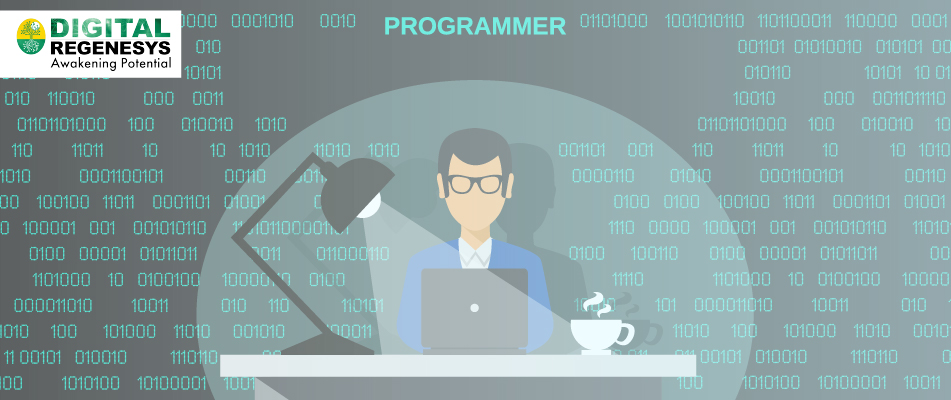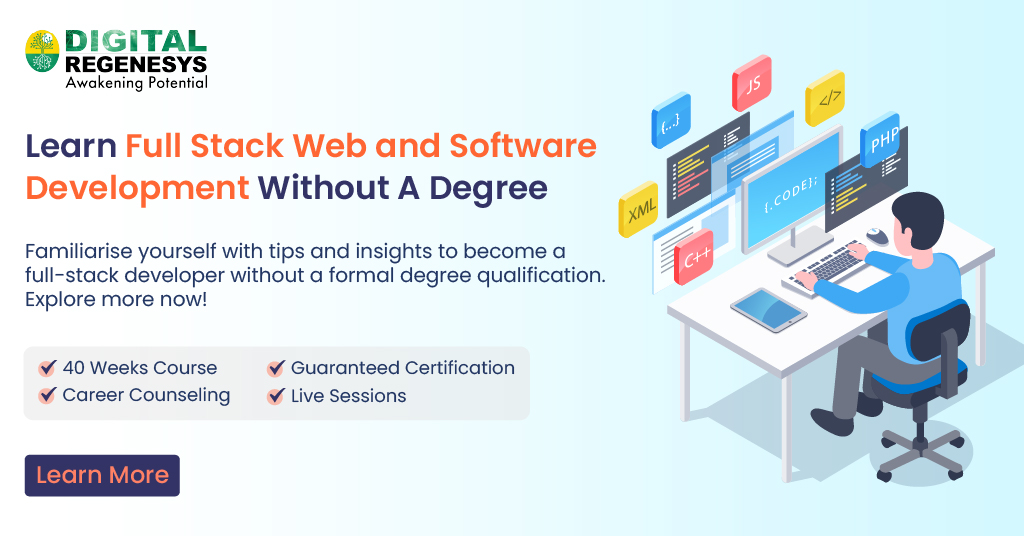Can I become a full-stack developer without a degree?

Beginners often wonder, ‘Is it possible for me to become a full-cycle developer without a degree?’ The answer is yes. You can become a full-stack developer without a formal education, especially when there is a high demand for this profession. At this moment, these engineers have limitless job opportunities since their skills and knowledge are precious across most industries. So, if you are wondering how to become a full stack developer, you can enrol in the best full stack development course now.
A full stack development process involves developing the front end and back end of an app or website. Therefore, a full stack specialist must have the skills to work from the beginning to the end of a web development project without the involvement of outside help. Hence, one might think that a formal degree in computer science or a related field is a requirement for such a career path. However, to your relief, you only need the proper skill set and guidance to set your career on this path.
In this article, let’s explore how to become a full stack developer without a degree.
Table of Content
- Core Skills Required To Become A Full Stack Developer
- Key Learning Resources to Gain Full Stack Development Skills
- Tips to Find Job Opportunities in Full Stack Development
- Conclusion
- Frequently Asked Questions
Core Skills Required To Become A Full Stack Developer
A full-stack developer is a skilled professional who must handle all aspects of web application development. That means they must conceptualise ideas, design attractive interfaces, and implement solid backend systems. Therefore, their expertise covers a wide range of technologies and approaches, making them the most important specialists of any development team. With their deeper understanding of the project and problem-solving skills, employers highly prefer them. So, let’s look deeper into the core skills required for a full stack developer:
-
Front-End Development Skills:
Most full-stack development processes rely on the fundamentals of HTML, CSS, and JavaScript to build responsive front-end interfaces. Therefore, full-stack developers must have a good understanding of these building blocks and be familiar with prevalent tools like React, Angular, or Vue.js.
-
Back-End Development Skills:
A full-stack developer must have better knowledge of back-end programming languages like C++, Python, and Java. Additionally, since these engineers write and execute JavaScript server-side code, they must know about frameworks like Node.js and Express. Furthermore, these engineers must be familiar with database management systems like MySQL and MongoDB because back-end development frequently entails building and maintaining databases.
-
Cyber Security Skills:
Full-stack developers must be proficient in online security fundamentals such as authorisation and authentication, system logging and monitoring, and defence against code injection threats. Additionally, they must be highly versed in data security principles such as transport layer security (TLS) protocols, encryption, and role-based access control. As a result, a full stack developer can ensure that a website is built safely and securely from cyber threats.
-
DevOps and Deployment:
Full-stack developers must learn to use tools like Git and GitHub for version control. They should also know about cloud platforms like AWS to efficiently and reliably deploy and host web applications. Additionally, they must be skilled at setting up continuous integration and delivery (CI/CD) pipelines to improve development processes and ensure smooth deployment cycles.
Key Learning Resources to Gain Full Stack Development Skills
For those interested in becoming full-stack developers without a formal degree, many learning options are available. There are diverse paths to acquiring the necessary skills. So, let’s explore the various learning opportunities and resources for aspiring full-stack developers, empowering them to embark on a journey of skill-building and career growth in the dynamic field of web development.
-
Online Courses:
Platforms like Coursera, Udemy, and Digital Regenesys offer comprehensive full stack web and software development courses. These courses help you master front-end and back-end technologies, including HTML, CSS, JavaScript, and more. You will also get hands-on experience and real-world projects to gain practical experience and knowledge of creating dynamic software apps.
-
Specialised Bootcamps:
Specialised boot camps are led by industry experts and experienced professionals who offer personalised mentorship and guidance throughout the programme. These boot camps help learners acquire the necessary skills in full stack development through hands-on learning experience. Additionally, after completing the programme, they will receive career services, job placement assistance, and networking opportunities to acquire full-stack development roles.
-
Networking Events:
Networking events are great opportunities for learners to connect with industry professionals, peers, and mentors. These events allow learners to engage in meaningful discussions, exchange ideas, and collaborate on projects with people from diverse backgrounds and expertise in web development. This helps learners gain valuable insights, receive guidance, and stay informed about the latest trends and technologies to thrive in the competitive web development landscape.
Tips to Find Job Opportunities in Full Stack Development
Pursuing a full-stack development career can be exciting and challenging. In today’s fast-paced tech industry, where skilled developers are highly demanded, finding the right job opportunity requires strategic planning and deep market insight. Whether you’re an experienced professional or new to the field, mastering the art of discovering job openings is crucial for achieving your career aspirations. So, we will provide valuable tips to help you efficiently navigate the job market and land your dream full-stack development role even without having a formal degree:
- Embrace networking and collaboration opportunities to expand your professional connections.
- Build a well-polished portfolio that showcases your best works in full stack development.
- Ensure to be involved in continuous learning to stay up-to-date with the latest tools and technologies.
- Enhance your non-technical skills, like communication and problem-solving, to stand out in the job market.
Conclusions
Becoming a full-stack developer without a formal degree is very much possible and can be a rewarding career path. You can build a strong foundation in essential skills like front-end development, back-end development, cybersecurity, and DevOps. Besides, with the right learning resources and dedication level, you can chart a successful career in this dynamic field.
Platforms like Digital Regenesys offer comprehensive courses in full-stack web and software development. These courses will provide hands-on experience, real-world projects, and personalised mentorship, equipping you with the necessary skills and knowledge. Moreover, by leveraging networking opportunities, continuously enhancing your skills, and adopting a proactive approach to job search, you will get an array of job opportunities and realise your full potential in full-stack development.
So what are you waiting for? Enrol in Digital Regenesys’s full stack web and software development course and take the first step towards a fulfilling career in full-stack development. Visit our website now for more.
FAQs – Frequently Asked Questions: Can I become a full-stack developer without a degree?
Q1) What is full stack development?
Full stack development involves building both the front-end (client-side) and back-end (server-side) parts of a web app or website. Hence, a full stack developer knows many different technologies and frameworks to work on all levels of the software stack, from the user interface to the server-side logic and database.
Q2) What are the core skills required to be a full-stack developer?
Full-stack developers must have solid skills in front-end development, such as HTML, CSS, and JavaScript. They must also have expertise in back-end development, using programming languages like Python and Java and frameworks like Node.js. Additionally, they should understand cybersecurity principles and be familiar with DevOps tools for deployment and version control.
Q3)How can online courses help me become a full-stack developer?
Online classes provide thorough training in full-stack development, covering both the front-end and back-end technologies. Platforms like Coursera, Udemy, and Digital Regenesys offer courses with practical projects, real-world examples, and personalised guidance to help you master the skills needed for a career in full-stack development.
Q4) How can I assess the quality and credibility of a full-stack development course?
When deciding on a full-stack development course, consider the curriculum, instructor qualifications, student feedback, industry connections, and post-program support, such as career guidance. Research the provider and seek recommendations from industry professionals to make an informed choice. Digital Regenesys offers practical training and a full stack web and software development certificate after completion for learners to excel in their field.
Q5) Do I need to learn both front-end and back-end technologies to become a full stack developer?
Full stack developers are often expected to have skills in both front-end and back-end technologies. However, some focus more on one side of web development, while others aim for a balanced skill set across both domains. The ultimate goal for a full stack developer is to be able to handle all aspects of web application development, from user interface design to server-side logic.
Last Updated: 3 April 2024
